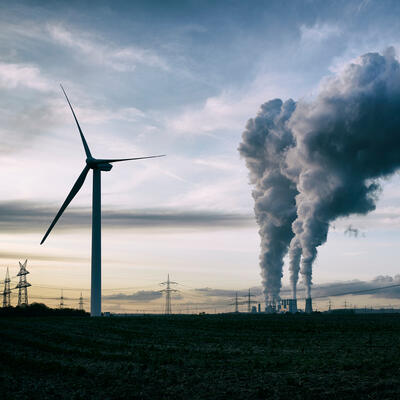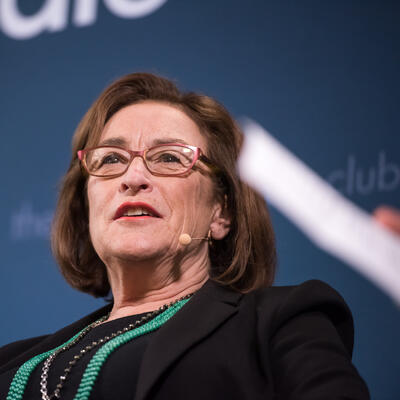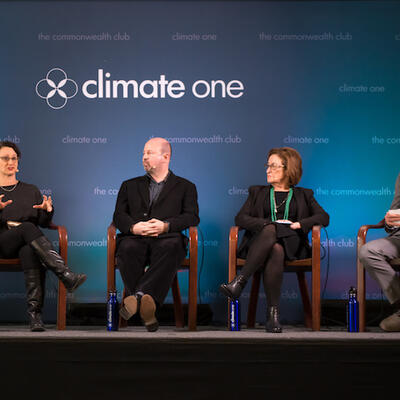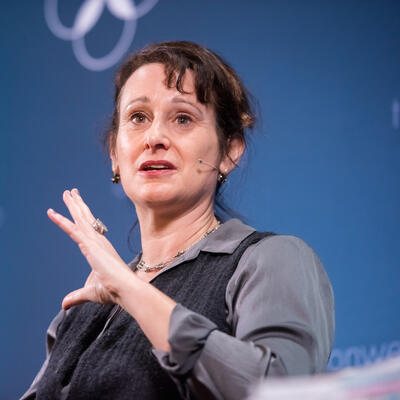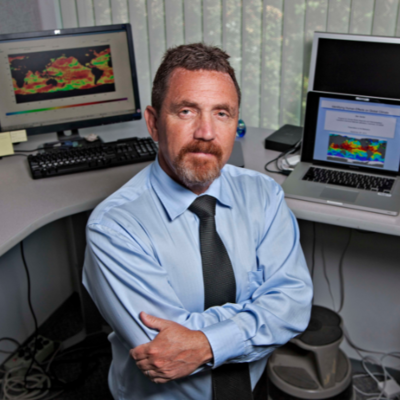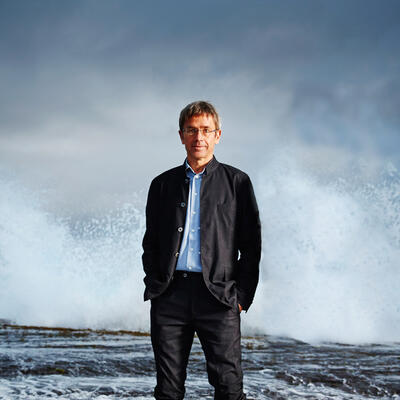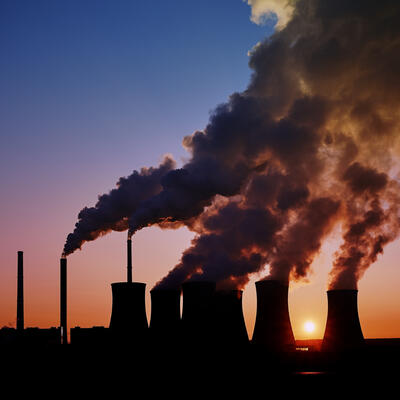
What the 2030 Climate Deadline Really Means
Guests
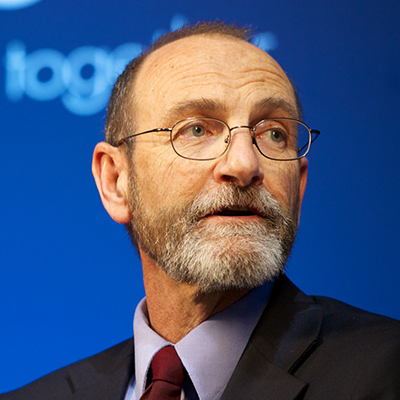
Chris Field
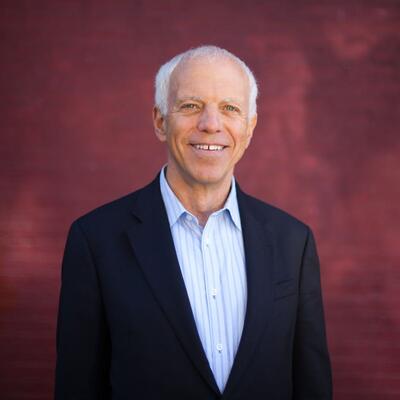
David Fenton
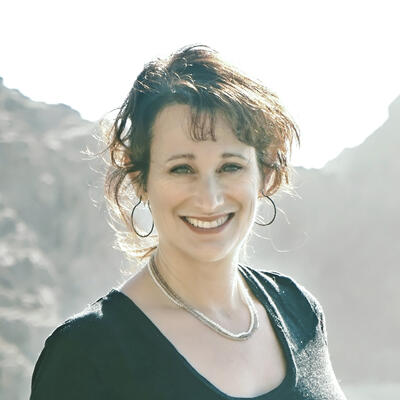
Renee Lertzman
Summary
Are we on track to meet our climate deadline?
For years, scientists have been saying that the climate battle will be won or lost in the next decade. The IPCC has stated that to avoid climate catastrophe, global emissions must be halved by 2030 and at net zero by 2050 – and we need to act quickly. Politicians and the media have picked up the message; some have made it a rallying cry. But is a ten-year goal realistic?
David Fenton of Fenton Communications says it is – we know how to do it, and we have the necessary tools. The problem is getting the word out.
“Most people don't read newspapers as much as they used to,” Fenton laments. “They get most of their information online and most of what they see online is that climate change is a hoax. So there is an information deficit.”
But as the situation goes from imminent to urgent to dire, the public has been slow to respond. Is the truth just too frightening for us to comprehend? Would sugar-coating the news help it go down easier?
“People deserve the truth -- it's a moral imperative,” Fenton maintains. “And people can handle the truth. And we cannot transform every building every airplane, every car and every power plant like we have to unless the public is engaged in understanding that this is an emergency -- and this is like war.”
Even if they are aware of the problem, the onslaught of bad news can cause many people to shut down. Climate strategist Renee Lertzman recommends using what she calls “an emotionally intelligent approach.”
That means incorporating the human dimension into climate journalism, using personal and complicated narratives to tell the story of climate change.
“The one thing I would say that's incredibly powerful is the unexpected,” Lertzman says. “There’s a lot of sort of numbness around the climate narrative in the climate news and the solutions…anything that breaks through the kind of the numbness that’s unexpected, surprising, shocking” will help.
“Millions of people feel stuck,” Lertzman continues. “And I think we have the opportunity to actually help us kind unstick by promoting the conversations…openly acknowledging like, yeah, you might feel really stuck, you might feel really frustrated. You might not see yourself as an activist; I didn't see myself as an activist. But guess what - this is what's happening, and this is why I’m acting.”
Related Links:
Environmental Melancholia: Psychoanalytic dimensions of engagement (Renee Lertzman)
How to Turn Climate Anxiety into Climate Action (TED Talk, Renee Lertzman)
Intergovernmental Panel on Climate Change (IPCC)
Stanford Woods Institute for the Environment
Climate reporters weigh coverage quantity against quality (Abby Rabinowitz , CJR)
Full Transcript
Greg Dalton: This is Climate One, leading the conversation about energy, the economy, and the environment.
On today’s program - cutting global carbon emissions in half by 2030. Realistic goal, or overly-simplistic? Does that ten-year deadline inspire hope and action -- or fear and panic?
David Fenton: It’s not enough to tell people that we can solve it because then there's no urgency and it is an urgent situation. And on the other hand, if you only tell people it's catastrophic a lot of people are gonna go to the beach. [:12]
For years scientists have been saying that we need to act quickly to avoid catastrophic consequences. But as the situation goes from imminent to urgent to dire, the public has been slow to respond. Is the truth just too frightening for us to comprehend
David Fenton: People can handle the truth. And we cannot transform every building every airplane, every car and every power plant like we have to unless the public is engaged in understanding that this is an emergency and this is like war. [:15]
Greg Dalton: What the 2030 climate deadline really means. Up next on Climate One.
---
Greg Dalton: Are we on track to meet our climate deadline?
Climate One conversations explore the need to transform every system around us - food, water, energy, transportation, politics and even the cognitive system inside our heads. Moving all those systems away from fossil fuels is necessary to stabilize the climate that supports our lifestyles and our economy. I’m Greg Dalton.
For years, scientists and politicians have been saying that the climate battle will be won or lost in the next decade. The IPCC has stated that to avoid climate catastrophe, global emissions must be halved by 2030 and at net zero by 2050. Politicians and the media have picked up the message; some have made it a rallying cry. But are people listening?
David Fenton: Most people don't read newspapers as much as they used to. They get most of their information online and those people most of what they see online is that climate change is a hoax..so there is an information deficit. [:13]
Greg Dalton: What is needed to get people to take notice of -- and take action on -- the climate deadline?
Renee Lertzman: The one thing I would say that's incredibly powerful is the unexpected...anything that breaks through the kind of the numbness that’s unexpected, surprising, shocking. [:11]
Greg Dalton: On today’s program, we talk about the logistical and emotional challenges of meeting that 2030 goal - and whether it’s even realistic. Joining me on the Climate One stage are Chris Field, Faculty Director of the Woods Institute for the Environment at Stanford and a co-chair of the Intergovernmental Panel on Climate Change or IPCC. David Fenton, founder of Fenton Communications and a veteran of many campaigns for social change. And Renee Lertzman, a psychologist and strategist with a new TED talk titled, How to Turn Climate Anxiety into Action.
What are we really talking about when we set a climate deadline? Chris Field lays out the basic science.
PROGRAM PART 1
Chris Field: Like probably the most important change in our understanding of the forcing in responses to climate change is the recognition that there is basically a forever CO2 budget. And the forever CO2 budget have a two thirds probability of staying under 1.5 C is around 2,750 billion tons, really big number. But we've already emitted over 2,200 billion tons and we’re emitting about 40 billion a year. If you do the math what that means is that if we want to have a two thirds probability of stabilizing warming at less than 1.5 C, we've got order 10 years of emissions at current rate as the remaining lifetime forever budget.
Now, you can say well, we can just slow down, then we can go way past 2030. But we’re not slowing down we've been speeding up in recent years. And this recognition that that's the budget no matter what we do has really changed the conversation and it's what brings us here this afternoon.
Greg Dalton: And it’s mind blowing to think that I keep coming back to this that half of that forever budget has happened in the last what 30 years that since Jim Hansen testified before Congress since Al Gore's first film. So most of that's been burned in the last 30 years. So tell us Chris Field, there's a lot of debate between a 1.5° warming world and a 2° world. You think that that distinction is too sharply chiseled, why?
Chris Field: There are a whole bunch of reasons that we need to stop climat e change. But there are a lot of reasons that it's hard. And a lot of the reasons it’s hard is that fossil fuels have fueled the legitimate development aspirations of people around the world, especially people in poor countries where the alternatives for access to energy for transportation aren’t anywhere near as mature as they are here. And so I think we need to be open-minded about our need for energy as the source for development aspirations for meeting development aspirations around the world.
What I think we need to do about climate change is work as hard as possible to be on a trajectory of ambitious mitigation. If we do that, the IPCC has shown that it's technically feasible to stabilize warming at 1.5 but it’s also shown that it's really hard. A world of ambitious mitigation might end us up at somewhere between 1.5 and 2 or it might end us up a little bit warmer than 2. But all those are worlds where the risks of really serious tipping points, the risks of catastrophic interactions among different kinds of impacts, and the risk of the kind a social collapse that makes it really hard to govern not only the climate system, but the global system, are really manageable. It’s important to distinguish this world of ambitious mitigation from the world of continued high emissions that we’re on now. That’s the important distinction whether it's 1.5 1.7 or 2 is much less important.
Greg Dalton: So some people get a little too hung up on the right side of the decimal point of the degree. David Fenton, this deadline has made its way into the political campaign headlines. A lot of people say we got 10 years. Do you worry about deadline panic?
David Fenton: Well, panic shuts people down. But I don't think it's a binary choice between hope and panic. I think it's a question of how you combine the two in talking to people. Because we can solve this, we know how to solve it, but if we don't solve it we’re in a lot of trouble. So I think you have to tell people both things. It’s not enough to tell people that we can solve it because then there's no urgency and it is an urgent situation. And on the other hand, if you only tell people it's catastrophic a lot of people are gonna go to the beach. So it's like most things it's how you balance the messages. Can I just ask Chris, where did the cut 50% in 10 years come from? Was that in the IPCC?
Chris Field: There are lots of trajectories you can think about for getting from high emissions to zero emissions. One way to do it is take the amount we've got and slice a diagonal through it and flip the upper triangle down; that gets you to a 50% cut in 10 years. It’s really, really hard to go from our current emissions, which has a CO2 equivalent about 50 billion tons a year to nothing in 20 years. And so to the extent that we use more negative emissions in the future we can have more continuing emissions in the near-term. But it's really wiggling the details. If we’re gonna cut to zero we basically have to come really close to having emissions every 10 years.
Greg Dalton: Renee Lertzman, I’d like to hear your thought on these targets as a psychologist, someone who thinks about how humans process these things. Your thought about these particular targets which are prevalent now in our popular culture and media culture. What's your take on these targets?
Renee Lertzman: Well, I'm primarily interested in how we process information that's charged and emotional. And hearing you speak about the data it's incredibly triggering charged emotional content. So that’s the lens that I’m bringing through this. So naturally when we’re confronted with information that's threatening that’s scary, that's overwhelming, we want to hold onto something tangible and it’s also a very powerful tool to mobilize and spark actions. So a lot of companies organizations use targets, cities, governments to say, this is what we’re gonna do. My concern, so yes in --
Greg Dalton: If you walk on with that, you know, how many steps am I gonna take today, right?
Renee Lertzman: Exactly. But it’s a yes and with regards to targets in climate change because the risk is that we set ourselves up with an oversimplification for one of the what it really is involved to get to these targets. We leave ourselves vulnerable potentially to missing the messy complicated nuanced roadmap to get to the targets, right. So I understand the need for targets to kind of spark that like get you motivated kind of thing. But ultimately, I don’t see it as a really a viable framework unless it comes with a deep thoughtful roadmap that we are co-creating together.
Greg Dalton: There’s also a bit of fatigue. David Fenton, I’m pretty sure I heard Al Gore 15 years ago say we got 10 years and here we are.
David Fenton: Well, I’m not responsible for what Al Gore says or doesn’t say.
Greg Dalton: Okay. But you did advise him, yes.
David Fenton: But, you know, we have to thank the vice president for sounding the alarm about those, he was right. You know, I think there's a bigger problem than this which is most people still don't know a lot about this. Most people still don't think this is urgent. Only 30% of Americans think solving climate change is an urgent problem. And even here in California where people know more about this than other places because of the fires, etc. only 50% of Californians think this will affect them in their lifetime. So I think that we have not done a good enough job of raising public knowledge, understanding and urgency on this issue. And I think that's the bigger problem.
Renee Lertzman: Can I say something? Well, again to the lens of how we process charged complicated content data. There’s such a thing as willful ignorance. There’s the fact that we often go into an inability cognitively to process information that we don't want that's distressing that challenges our worldview and identity. So when we hear data about people don't know or people aren't engaged, I always think of it in the context of whether people may be distancing or avoiding or kind of in some form of soft or hard denial around as opposed to taking it at face value that people, I don't buy that people are as ignorant as we think they are, there’s a willful ignorance. Because it's too overwhelming, it’s too scary to contemplate. And for a lot of people I talk to they don’t even know how to go there. They need some guidance along the way.
Greg Dalton: And there’s just some people who don't like the solutions to climate change. Therefore they're not going to acknowledge the problem. Chris Field.
Chris Field: I just wanted to say one thing in defense of Al Gore, you know,15 years ago it made sense to say we have not yet seen impacts from climate change, but we will in a few years and we have. Now we have definitely passed the threshold where year after year after year we're seeing real impacts of climate change that in some cases are really having devastating consequences
Greg Dalton: Big change. So as David says the weather is teaching people. It’s happening now it’s no longer something far off.
Climate writer Abby Rabinowitz [rah-BIN-oh-witz] surveyed a bunch of writers who cover climate change and asked how the media could do a better job on the beat. Here are insights from her reporting and her experience
[Start Playback]
Abby Rabinowitz: We’re actually at a really exciting moment with climate coverage. I interviewed a number of editors and also writers for a piece I wrote for the Columbia Journalism Review. And one thing I heard a lot is that climate change should frame every beat and it should be on every beat as long as it’s applicable. It’s environmental, it's business, it's social, it’s the air we breathe, it’s our personal health. It’s our allergies it’s lyme disease, it’s all climate change.
I don’t think the science is actually that complicated or strange. It’s a very intuitive concept; we’re blanketing the earth with this gas that contains heat. I wonder how often people think about the science behind gravity. Does it need to be explained every single time we report a sports article. Well, the ball dropped because gravity was happening and this is about the mass of a greater object than the mass of the smaller object and attraction. You don’t need to do it every time. The truth is frightening and clear enough that we can be both accurate and urgent in our language as journalists. I think that we need to tell engaging rich stories with protagonists. I think we need stories about people working to make a change in the face of extraordinary loss and grief that they’re taking personally.
[End Playback]
Greg Dalton: That was journalist Abby Rabinowitz who also directs the writing program at NYU's Engineering School. David Fenton a lot in there don't need to talk about the science don't need to talk about gravity, personal human stories. Your response to what she said
David Fenton: True and not true. Stories are great, they’re important they inspire people. But there is an information deficit in this country. I'm advising a group right now that just did a survey of coastal property owners in a very vulnerable state who own middle-class homes on the coast. And we asked them if it was flooding more they said yes. We asked them if they were concerned about the flooding they said yes. We asked them what's causing the flooding, 80% said bad sewer systems and overdevelopment; only 20% could identify rising seas from climate change. And if you trace the actual data and information flow to people like that most people don't read newspapers as much as they used to. They get most of their information online and those people most of what they see online is that climate change is a hoax. That's what most conservatives see. So there is an information deficit. And I think also that to arouse the public to mobilize for the transformation of the economy that we need and all the infrastructure people have to be able to explain to you why we have to do that and they're not really at the point where enough people can do that yet.
Greg Dalton: Chris Field, we heard there that science is not that complicated. The science is simple and David also mentioned information deficit, which is the idea that if people just had more information one more book one more podcast one more this, they would somehow flip a switch in their brain they get it. But that's flawed isn’t it?
Chris Field: David makes a compelling argument though. And, you know, he's the person who has done the surveys to ask whether people have heard the information. In my presentations, you know, I suspect all of you know about climate change and care about it enough to come. And I think that we can potentially fool ourselves into feeling that the messages are spreading more effectively and more broadly. And I think that the counter narrative that climate change is a hoax probably has traction and it may well have way more traction than I appreciate.
Renee Lertzman: Well, I just want to say it goes back to the point around how do we process charged and difficult information and data. And I’ve interviewed hundreds of people having in-depth conversations. What I find is a very complicated picture where people kind of know, but they kind of don't want to know and choose not to know. And so what that suggest to me is that we do need to be incredibly thoughtful about the ways in which we are communicating with people that ideally sort of soften that defensive limbic response which can include the personal storytelling in the sense that there's some hopefulness and there's some solutions as well as being able to just be real and honest and acknowledge like this is intense, this is hard. Thus you might feel this, you might feel overwhelmed you might feel that. That can actually allow people to process and learn more effectively by what’s happening.
Chris Field: And we often think of the information deficit model as you're an idiot, I'm right I'm gonna give you the facts. And we know that doesn’t work.
Greg Dalton: Persuasion doesn't work. People try often by just persuade you if you just knew this fact and swallowed it, you’d think and you'd see it like I do. And then things would be okay.
David Fenton: Cognitive science shows us what does work. And everything Renee said is completely true. You have to do this in the right way that acknowledges people's feelings and fear all of that. But the main thing to know is what changes the brain is the repetition of simple messages that mostly have a moral context and are emotional. It is the repetition that changes it. We hate make America great again but I'm sorry to tell you the science is clear that works. Now in the community of scientists and activists understandably complexity is what we value to try to get to the truth. But communicating in a complex way does not work only simplicity works and only repetition works. And a lot of us don't like to simplify things and we hate repeating ourselves but that’s what works.
Greg Dalton: Saddam 9/11, Saddam 9/11, Saddam 9/11, Saddam 9/11. That clearly worked. David Fenton, also why is that? Spin that out a little bit in terms of the way people think the repetition and how that's rewarded or not rewarded for people's career.
David Fenton: Well, people that go to business school learn cognitive science and they have to learn how to sell things and market things to advance their careers to sell products and services. So that's their orientation. And, you know, people in the sciences and the law and the humanities that's not what they study. So it’s kind of a mismatch. So a lot of us think that kind of because we know something we assume other people know it too. And the other side does not make that mistake.
---
Greg Dalton: You’re listening to a Climate One conversation about the coming climate deadline. Up ahead, doomsday scenarios. Are we headed towards human extinction?
David Fenton: I don’t know about extinction. But I do know that at the rate we’re going we’ll have to abandon all the coastal cities of the world at some point. And imagine the chaos, how do we survive that? [:09]
Greg Dalton: That’s up next, when Climate One continues.
---
Greg Dalton: Hi everyone, I’m Greg Dalton, Climate One founder and host, and I’ve been interviewing top experts on all things climate since I started the Climate One podcast over a decade ago. But now, you’re the one I want to interview. Climate One would love your honest feedback on a survey we’re doing to better understand our audiences. We’re offering you the chance to win one of eight $250 gift cards by going to climateone-dot-org-forward-slash-survey.
We value your opinion. Thanks again for taking our brief survey. Again, that’s climate-one-dot-org-forward-slash-survey.
Greg Dalton: This is Climate One. I’m Greg Dalton, and we’re talking about the 2030 climate deadline. My guests are psychologist and author Renee Lertzman, Chris Field, a climate scientist at Stanford and senior leader on the IPCC, and David Fenton, a climate communications expert.
Earlier in the program, Renee Lertzman brought up the ways that dopamine and serotonin factor into our response to the climate crisis.
PROGRAM PART 2
Renee Lertzman: In the context of this conversation what I’m most interested in is what triggers our dopamine response and what supports our serotonin. And we can think of that as a metaphor for engagement with the issue. How do we stay connected and engaged with an issue that is scary and overwhelming and so forth.
So the research that I found game changing has been by Robert Lustig here at UCSF where he wrote a great book Hacking the American Mind where he talks about what has been established to promote dopamine and serotonin. And for him he came up with what he calls the 4 Cs. And I use these 4 Cs in my climate communications and engagement work. When we feel connected when we feel we are contributing to something when we feel that we have tools to cope with stressors. And his fourth C is cooking which is very interesting because apparently cooking makes us, it promotes a lot of serotonin. I tend to kind of interchange cooking with creativity. So when we’re creatively involved in the stuff of our lives, gardening, cooking, you know what have you. And what I relate that to with the climate crisis is when people are asking me how do we design a way to engage people make people care and motivate people. I always flip it in the context of what promotes serotonin. In other words we’re in this for the long haul. This is a marathon it's not a sprint. There's lots of things that can promote kind of short action like here’s a pledge and here's the challenge and here’s the target.
Greg Dalton: So that’s dopamine, which is like a quick sugar happening.
Renee Lertzman: Yes, it’s a quick kind of like immediate more of a limbic response. Whereas the serotonin you might think of is what is sustaining. And that's through relationship and it’s through our experience of ourselves as having agency, feeling that we have some power and that we’re in control. So when I'm giving advice I would say well as long as you allow people or enable people to feel that we are partners that you are just as much a part of the story as I am and that we are in this together. That in itself really allows us to face what I think is on some level unthinkable.
Greg Dalton: And Chris Field, you know, the word extinction gets thrown around a lot these days. Climate scientists are often invoked scientists say we got to go faster and yet you talk to individual scientists and their hair is not on fire. Some of them are more moderate and temperate than the people who are quoting the scientists. So tell us about is the actual extinction of the human race is that in the models or is it because we often hear this is existential, human extinction, right. Is that really a possibility in the math you look at?
Chris Field: There's no question that we have seen major extinctions through the history of the earth. Many people feel that we may be starting into a sixth major extinction. In the most massive extinctions to date we've seen loss of as many as 90% of the species from the geological record. We've seen only a few extinctions that we can trace with any level of confidence to climate change so far. But we've only seen a small amount of the climate change we might see. And again, I want to contrast a world of ambitious mitigation where we would see more extinctions, almost certainly not the extinction of humanity, and a world of continued high emissions. In that world of continued high emissions what really bothers me, it bothers me that in 2100 we might be looking at 4 1/2 to 5 C warming over preindustrial. But what really bothers me about that is that we’re still warming at half a C per decade.
David Fenton: Can you tell people what that is in Fahrenheit?
Chris Field: About one Fahrenheit per decade roughly.
David Fenton: Five C is how much Fahrenheit?
Chris Field: Nine. So it’s really rapid warming into the indefinite future that we worry about and we often don't think enough about the way that every time we build a new coal-fired power plant, every time somebody builds a new kerosene powered jetliner, we’re committed to decades of using that infrastructure. And what I'm worried about is if we’re still building new power plants and new kerosene powered jetliners in 2080, we're going to cruise through the end of the century mark with that continued warming. Now what happens if we’re warming at to defer to David's recommendation that we use English units when we’re more than 10 Fahrenheit above pre industrial and when we’re increasing at a degree per decade is there a risk that humankind would become extinct as a result of this? We have no way of even making crude estimates.
I can tell you that if you look at the evidence from economists they say some places do better some places do worse with warming. And even if you project that out to the kind of massive amounts of warming we’re talking about. And so personally I think that we’re on a trajectory to solve climate change way before the extinction of the human race is a major risk. But the possibility of interacting impacts unexpected complications breakdown of the social fabric and loss of key ecosystem services point to a much more challenging future unless we stay in this world of ambitious mitigation.
David Fenton: And if I may, I don’t know about extinction. But I do know that at the rate we’re going we’ll have to abandon all the coastal cities of the world at some point. And imagine the chaos, how do we survive that. People in Southern Asia, India and Pakistan will literally die walking out on the street we won't be able to till the fields. That is what we’re headed for. I believe it's true that the amount of carbon dioxide in the atmosphere now previous in our geologic history that same amount, the seas were about 70-feet higher than they are today. So we’re not only gonna have to reduce emissions we’re gonna have to take some of the stuff out of the air. And the good news is that we can and we can do it. It certainly affordable it’s a lot more affordable than all that destruction. But we have to rally the public to demand this. That's the only solution I see.
Greg Dalton: Renee Lertzman, this gets to --
Chris Field: The last time the CO2 concentration was this high as it is now we think the sea level is about six meters higher.
David Fenton: Six meters.
Chris Field: 20 feet not 70 feet.
David Fenton: That’s enough, right. Okay, thank you.
Greg Dalton: That’ll still flood most major cities. Renee Lertzman, this gets to the point of debate as, you know, how candid how dark is it how screwed are we and should we really talk about that or some people say, no don't say that because there's sort of a paralysis or a despair. But you think that's a myth, why? The people will lapse into despair if they’re told the dark truth.
Renee Lertzman: Well, I think that humans in some way or another we actually respond and crave truth even if it's hard truth. But the question is what the context is that allows us those conditions you talked about in your opening, what are the optimal conditions that allow us to really be with what’s real and what's true. We see this in young people, young people light up and crave learning and knowledge and truth. And so I think it's incredibly dangerous to think that we need to ever minimize to soften to sugarcoat to not go there to, you know, keep it all light and solutions oriented and not talk about the reality of loss and turbulence and despair and disruption. It's like, you know, give it to me -- it’s the sense of like give it to me straight like people have a radar for being messed around.
Greg Dalton: So you think that people can handle the truth they won't get stuck in it. They actually crave it they want it and --
Renee Lertzman: And it’s the conditions in which that happens that makes all the difference. If you're in a classroom where you’re able to actually talk about what comes up for you as we’re learning these things. What are your responses what does this make you think about what are you excited about what are you scared about. If you’re in a family if you're in a group of friends if you're in a program like this, you know, it's the conditions that allow us to confront and be with what is scary and hard and that's where relationship comes in. When we feel that we’re in relationship in connection we can handle so much more than if we feel like we’re alone and we’re sort of on our own with it.
Greg Dalton: David Fenton a lot of communication people say we got to be upbeat or optimistic because otherwise we got to -- don’t talk about sacrifice because Americans don't do that anymore. Maybe they did during World War II. Got to sugarcoat this whole thing.
David Fenton: Well, that’s just morally wrong. People deserve the truth it's a moral imperative. And people can handle the truth and we cannot transform every building every airplane, every car and every power plant like we have to unless the public is engaged in understanding that this is an emergency and this is like war. And by the way, you know, war is actually has very interesting psychological effects on populations. More babies are born, people have lots of fun. This is gonna be like a war only it's a good war to save ourselves and we’re gonna come out much better for it. Energy is going to be cheaper that is for sure. We’re gonna have far less pollution there’ll be much more employment there’ll be much more wealth like there always is in major infrastructure transformations in history. So we have to tell that story. But we also have to say and you know what we need to hurry up.
Greg Dalton: Renee Lertzman, I wanna ask you, there’s been lessons learned from public health and how to shift behavior and flip convention on its head. So tell us what public health can teach us about this.
Renee Lertzman: Well, so there is a field or a school practice in public health called motivational interviewing. And it's completely influenced my way of thinking about climate environmental engagement and communication. So motivational interviewing or MI for short is a practice that clinicians have developed that's really the most evidence-based approach to really shifting hard behavior change that’s out there. And if you really look at what it's about it’s quite radical. Motivational interviewing is really about supporting people as a guide.
So it flips the whole idea that I'm gonna tell you what you should do because it's the right thing to do because if you don't, you’re gonna die or you’re gonna get really sick all these bad things are gonna happen to you. It’s about taking the knowledge that we may have those of us who actually know quite a bit about the issues and sitting on it long enough to really allow others to reflect on what their relationship is with the issue. So MI in its essence is being what it means to be a guide as opposed to being a cheerleader or an educator or a righter, it’s really about inviting people say well, what is it that, you know, what matters to you and what do you feel that you can actually meaningfully do? So it's a way of engaging people in a conversation with the focus being on change.
Greg Dalton: And do you think so much of communication these days is over social media. Do you think that kind of empathy can happen on social media where villainization and attacking is rewarded you get a big audience. Climate One would have a bigger audience if I villainize and attack people
Renee Lertzman: I think that without a doubt, it can be done very, very effectively on social media across all kinds of platforms but it takes a level of skill. And the skill is that you need to be able to know how to raise provocative questions and prompts that allow people to reflect and respond in ideally an honest and human way. So my Twitter life there's a lot of climate folks on there. And I noticed that when people share or they tweet something that's actually really human like there's a number of women in particular who are very brave and very courageous in tweeting about their lived experience of wrestling with these issues. What I noticed is that there's huge response, it blows up. So I think that people are actually really hungry for that kind of communication and interaction in twitter but it’s such a fine line where it can just easily degenerate and devolved very quickly into just like you said just the real polarizing kind of base.
Greg Dalton: We’re talking about the climate deadline 2030 at Climate One. I'm Greg Dalton. Our guests are Chris Field, Director of the Woods Institute for the Environment at Stanford University. Renee Lertzman, a climate Engagement Strategist, Speaker and Psychologist. And David Fenton, founder of Fenton Communications.
We’re gonna go to our lightning round and invite you to respond to the association. I'm gonna mention a phrase and you can answer with just one word or one phrase whatever comes to the top of your mind unfiltered. So from your reptilian brain or whatever that part of your brain is most honest. Chris Field. What comes to mind when I say carbon capture and sequestration?
Chris Field: Yes. Yes, to all of the options to solving the climate crisis.
Greg Dalton: David Fenton. Facebook.
David Fenton: Bad.
[Laughter]
Greg Dalton: Okay this is true or false. Chris Field, every bit of warming matters?
Chris Field: True. No doubt.
Greg Dalton: David Fenton. True or false, every act to reduce carbon pollution matters?
David Fenton: Yes, because it gives people the sense that together they can make a difference.
Greg Dalton: True or false. Renee Lertzman, every act really doesn't matter we just want to believe that?
Renee Lertzman: False.
Greg Dalton: David Fenton. True or false, you have considered getting arrested at a climate protest?
David Fenton: Yes.
Greg Dalton: Renee Lertzman, one day you probably will engage in civil disobedience as part of a climate protest?
Renee Lertzman: Yes.
Greg Dalton: Chris Field. Stanford’s divestment from coal companies with an empty gesture because coal is a crappy investment and many coal companies have gone bankrupt?
Chris Field: Yes.
[Laughter]
Greg Dalton: Also for Chris Field.
Chris Field: It was an okay gesture, but it was empty eventually.
Greg Dalton: Also for Chris Field. True or false. Stanford should divest from all fossil fuels?
Chris Field: I disagree with that and be happy to go on at length.
Greg Dalton: True or false. Renee Lertzman,, the white men on this panel with you are good listeners?
Renee Lertzman: True.
Greg Dalton: Let’s give them a round of applause for getting through the Climate One --
[Applause]
---
Greg Dalton: You're listening to a conversation about facing the climate deadline. This is Climate One. Coming up, finding the courage to take action.
Renee Lertzman: You might feel really stuck or you might feel really frustrated. You might not see yourself as an activist, I didn't see myself as an activist. But guess what, this is what's happening and this is why I’m acting.[:10]
Greg Dalton: That’s up next, when Climate One continues.
---
Greg Dalton: This is Climate One. I’m Greg Dalton. Climate One records many of our conversations with a live audience at our modern and green new home on the waterfront in San Francisco. When you are in town I invite you to come check us out. Our programs are open to the public and listed on climateone.org.
We’re talking about the 2030 climate deadline, with communications expert David Fenton, psychologist Renee Lertzman, and Stanford climate scientist Chris Field.
When I think of going over the “climate cliff,” I often picture the old cartoons. Remember Wile E. Coyote chasing the Road Runner? Every episode he raced out over the cliff without realizing it, then suddenly looked down and --- kaboom! Will humanity see the cliff before it's too late? Chris Field has a theory.
PROGRAM PART 3
Chris Field: When I think about tipping points there are really three that concerned me the most. And I think about a tipping point as genuinely a point of no return. One concerns sea level rise. We know that based on the underlying geology of Antarctica we know based on the elevation profile of Greenland that there's some point at which we’re committed to large amounts of sea level rise even if we use carbon capture and storage to bring the CO2 down, even if we could cool the climate back that we’re committed to in excess of 5 meters of sea level rise which is the level that's really existential for coastal communities for many small island nations. We have a pretty high level of confidence that we haven't passed that tipping point yet but we also have a pretty high level of confidence that sits within the next I think we have an international audience. So 1 to 2 C of future warming or 3 to 4 Fahrenheit of future warming. So that commitment to more than five meters of sea level rise more than 15, 16 feet of sea level rise really existential for a lot of the world’s population.
Second really critical tipping point concerns responses in which the Earth system starts releasing greenhouse gases to the atmosphere independent of what we people do. One mechanism by which that happens is when the Arctic warms so much that melting permafrost is a big source of greenhouse gases. Another is when areas like the Amazon convert from being essentially fire proof to fire prone. Under those conditions, even if we bring greenhouse gases down to warming we might see a continued progression of world of high emissions because the emissions are coming from nature. That's a tipping point that we’re pretty sure we haven't passed yet and is probably within the next 2 to 3 C, 4 to 6 Fahrenheit of warming.
And then the third kind of tipping point that worries me and this is the one that worries me almost the most is it's really clear from the analysis of global economies that there are many parts of the world that are more impacted by warming than others. It's mostly the poor countries. It's mostly countries that are already in hot climates that are really the most impacted and where future warming just tremendously erodes their potential for future economic growth. What concerns me is if climate change really does drive a separation between the economic winners and the economic losers, we lose whatever chance we have for a society of sufficient social cohesion to tackle this problem in a meaningful way.
So at least for me those are the kinds of issues that really represent points of no return. Let me just say one more thing about the sea level rise and I should've said it earlier. We don’t have a very clear picture of how rapidly this ice sheet collapse might occur. Most of the estimates are that if we are committed to more than 5 meters of sea level rise it would probably occur over 500 years or more. Maybe that's room for coastal communities to rethink their future. But if you think about the prominence of cities like Venice that have been there for a thousand years for key iconic coastal sites around the world 500 years really isn’t a very long time.
David Fenton: Yeah, it doesn't really matter how long it's going take; it's immoral to do that. It’s just immoral to knowingly do that. And that's what's happening now, there are forces in our world that are knowingly doing that to the people in the earth and we have to stop them.
Chris Field: But it is important to remember that if we were having this conversation in 1520 rather than 2020 it would be hard for us to imagine the world of 500 years in the future. I agree with your point about immorality but --
David Fenton: Sure, sure, sure. But, you know, and technologies may well emerge that we don't know about but we can't bank the future of civilization on that. That's immoral too. We know how to solve this and again solving it is really going to be a good thing in so many ways as you pointed out. So we’re facing in my view, the sort of the ultimate moral story of human history which is are we really going to let a very few companies do this to the future of humanity when we don't have to. If you had to do this to have prosperity and growth, sure, okay that would be a terrible thing. But we know we don't have to do this.
Greg Dalton: We’re gonna go to audience questions. Welcome. Welcome to Climate One.
Female Participant: Hi, I’m Jackie Garcia I’m a number of 350 Contra Costa. This message is for Renee. I wonder if you think it's useful to educate people about the fact that our lifestyles are emitting the most carbon and greenhouse gas emissions that will later raise the temperatures across the globe in places and disadvantage people who are in frontline communities are not actually polluting as much as we are.
Renee Lertzman: Oh gosh, absolutely. Yeah, I think it's vital that we bring that level of empathy. I mean I guess my message is empathy generally is one of the most powerful effective strategic orientations we can have and how we’re communicating. Empathy is not the same as letting anyone off the hook. Empathy actually allows us again it softens our defensive mechanisms, right. It softens our tendency to resist. And when we feel that there's empathy when I feel understood I’m able to listen and engage and learn exponentially higher.
Greg Dalton: Do you feel guilty about your lifestyle?
Renee Lertzman: Absolutely, of course.
Greg Dalton: I sure do. Next question, please.
Male Participant: Thank you. My name is Jeff Mann. Chris Field, why do you think that Stanford should not divest from all fossil fuels. You sort of hinted on that before.
Chris Field: I think that part of our problem is over emphasis on the truly reprehensible actions of a few companies in creating misinformation. But I think it also when I look at how we’re gonna solve the climate problem I actually find it very hard to envision a set of solutions that doesn't involve the competences that the more forward-looking oil and gas companies bring to the table. Things like being able to manage international projects across many countries at billions of dollars of scale. Being able to drill precise holes underground and bust up rocks and shoot things into them. And I think there are lots of investments that should be spurned for ethical grounds and many fossil fuel companies should be. But I also think that we’re not gonna solve this problem without bringing fossil fuel competences into the mix.
And so I think that to be impactful divestment efforts should be targeted toward particular companies and they shouldn't be blanketed. I also think it's important to recognize that demand for fossil fuels comes from all of us everybody who turns on a light switch or takes a jet flight or drives a gasoline powered car. And it’s deceptively easy to say, oh, if it just wasn't for those companies we wouldn't have this problem when we really need to recognize that emissions are coming from billions of decisions that are made around the world every day.
David Fenton: Sure, and that’s true, and I've often thought we should thank the fossil fuel companies. Great job, look at all this prosperity and now we know it's time to change, and, you know damn them with praise. But at the same time I am hesitant to blame individuals, you know, individuals are not responsible for the state of our infrastructure. Those are forces beyond what most individuals can affect except for political action. So I think of course like everything else it’s a balanced picture we all do contribute, but ultimately this is a system problem. It's not an individual problem.
Greg Dalton: Next question. Welcome.
Female Participant: Hi, my name is Annie Leonard I’m with Greenpeace. I have a question about this 30%. On one level, having 30% of the people alarmed about climate is embarrassingly small, given how clear the science is. But on another level that’s a lot of people. That's more than Martin Luther King had when he had his I have a dream speech that's more than the suffragettes had and the abolitionist have, 30% of the public we should be able to drive big change. So what advice would you give to an activist about the relative importance of growing that 30% to be 60% alarmed or mobilizing that 30% to go from being alone and distraught to together and active?
Renee Lertzman: Excellent question. Thank you. So a few things. One is, I think we need to be unleashing conversation. So wherever possible we need to be promoting, supporting and facilitating people who are in any way convening whether it's teachers or in churches or whatever to have open honest real conversations where there’s psychological safety so we can get real and then move quickly into strategizing, activating and so forth. Until we do that people are in that paralysis, ambivalent, anxious state. So I can't say enough about what happens when people get together especially in small groups and can actually talk to each other and we see that as a profound driver of activism and change.
And adding on to that I would say my advice to activists is to skill up around how we manage our own sense of urgency and our own sense of fear and panic. And to become able to channel that in ways that are effective but to invest more and really trying to understand and practice the compassion and the empathy for why people are concerned and yet doing nothing. Because that's really the silent majority; it’s this ambivalent majority of people who feel completely stuck in a double bind and millions of people feel stuck. And I think we have the opportunity to actually help us kind unstick by promoting the conversations and also openly acknowledging like, yeah, you might feel really stuck or you might feel really frustrating. You might not see yourself as an activist, I didn't see myself as an activist. But guess what this is what's happening and this is why I’m acting. Anything that allows us to really connect at that human level.
Greg Dalton: Last question. Welcome.
Male Participant: Hi, Greg. It's Mark Hertsgaard I’m the environment correspondent with The Nation and the executive director of Covering Climate Now. We know that we have to cover the story of the 2020 election and some people would say that this election will decide the climate future certainly if the current administration were to stay in power. So I’d like to ask all three of your guests. What is the story that the press should be trying to tell over the next 11 months and how should we tell it?
Greg Dalton: David Fenton.
David Fenton: Well, I think that the print process has largely done a very good job with this. The problem is television, Mark as you know. And I know you're working on that. Until recently the ABC, NBC, CBS morning and evening news programs like barely mention the word climate change and don't cover the story. And while they have a smaller audience and they used to their combined audiences I think about 35 million people and it's missing on television it’s on cable but that's a very small audience. And half the cable audience is watching Fox which is purposely disinforming people. So I think really the challenge is to get it on television, which is the most powerful medium that we have and of course those videos get played on the Internet, etc. But by a large I think the print process is doing a superb job
Greg Dalton: Renee Lertzman.
Renee Lertzman: So I would say an emotionally intelligent approach. Reporting journalism that brings in the human dimension as much as possible that shares nuanced through personal story through allowing people to share their complicated stories. The one thing I would say that's incredibly powerful is the unexpected. So there's a lot of sort of numbness around the climate narrative in the climate news and the solutions and all of that. Anything that breaks through the kind of the numbness that’s unexpected, surprising, shocking, and to me that story is people who have gone from - it came up early in our conversation people who are conservative Republicans who are now really acting on this. Pastors, farmers in Iowa, you know, young kids in the hood who are now activated like really bust open the story so the faces and the stories are so diverse and so surprising and so energizing that people really feel it at that visceral level.
Greg Dalton: You’ve been listening to Climate One, and a conversation about climate urgency and action. My guests today were Renee Lertzman, a psychologist with a new TED talk titled “How to Turn Climate Anxiety into Action,” Chris Field, Director of the Woods Institute for the Environment at Stanford University and David Fenton, founder of Fenton Communications.
Greg Dalton: To hear more Climate One conversations, subscribe to our podcast wherever you get your pods. Please help us better understand you, our listeners, by taking a brief survey at climateone.org/survey. Everyone who participates will get a shot at one of eight $250 gift cards to thank you for your time.
Greg Dalton: Kelli Pennington directs our audience engagement. Tyler Reed is our producer. Sara-Katherine Coxon is the strategy and content manager. Steve Fox is director of advancement. Anny Celsi edited the program. Our audio team is Mark Kirchner, Justin Norton, Arnav Gupta, and Andrew Stelzer. Dr. Gloria Duffy is CEO of The Commonwealth Club of California, where our program originates. [pause] I’m Greg Dalton.
Cranky Uncle Vs. Climate Change: 30-sec. Mid-Roll Advertisement
Greg Track: Sponsorship for this podcast is from the new book, Cranky Uncle Vs. Climate Change - an illustrated guide on how to talk to climate deniers. Dr. John Cook, founder of the website Skeptical Science, takes us on an educational tour through the world of climate disinformation and provides insightful and often humorous tips for debunking popular myths.
Our listeners ask me all the time how to talk to climate change deniers, now I can suggest a copy of Cranky Uncle Vs. Climate Change! It is a funny and informative read for people of all ages, and great preparation for those holiday dinners with your own cranky uncle. Changing people’s minds is a difficult task, but identifying and preventing the spread of misinformation with proven data and scientific evidence can be just as important.
Pick up your copy of CRANKY UNCLE VERSUS CLIMATE CHANGE today everywhere books are sold! For more information, visit Cranky Uncle dot com.
